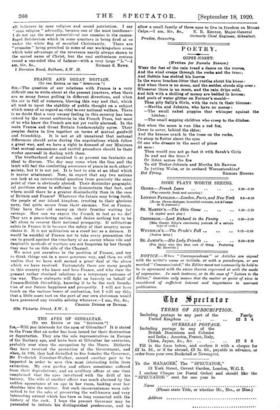FRANCE AND GREAT BRITAIN.
(To THE EDITOR or THE " SPECTATOR "1
Sri,—The question of our relations with France is a very difficult one to write about at the present juncture, when there are so many forces pulling in different directions, and when the air is full of rumours, blowing this way and that, which all tend to upset the stability of public thought on a subject which many of us regard as vital to our national welfare. There is no doubt that a very uneasy feeling in this country has been caused by the recent outbursts in the French Press, but most of us who know the French are not yet really alarmed. In the main France and Great Britain fundamentally agree. Their peoples desire to live together on terms of mutual goodwill
and friendship. It is not at all unnatural that national differences should arise during the negotiations which follow a great war, and we have a tight to demand of our Ministers that mutual concessions and tactful procedure should be their modus operandi in dealing with them.
The brotherhood of mankind is at present too fantastic an ideal to discuss. The day may come when the lion and the lamb will feel the comforting assurance of peace in each other's society, but it is not yet. It is best to aim at an ideal which is nearer attainment. Now, to expect that any two nations can look at an international question from precisely the same point of view is obviously absurd. Their dissimilar geographi- cal positions alone in sufficient to demonstrate that fact, and where could there be a greater dissimilarity than in the case of Britain and France? Whatever the future may bring forth, the people of our island kingdom, trusting to their glorious navy, feel quite secure from their enemies. Not so France. They have their old enemy on their frontier waiting for revenge. How can we expect the French to feel as we do? They are a peace-loving nation, and desire nothing but to be left alone to recover their national prosperity. If militarism exists in France it is because the safety of that country neces- sitates it. It is not militarism as a creed but as a defence. It would be suicidal of France not to take every precaution she can to guard against the treachery of an enemy whose vile and despicable methods of warfare are not forgotten by her though they may be on this side of the Channel.
We must put ourselves in the position of France, and try to think things out in a more generous way, and then we will realise that we have well earned a great deal of the abuse which we have received. Fortunately there are many people in this country who know and love France, and who view the present rather strained relations as a temporary outcome of the war. These stalwarts will fight on bravely on behalf of Franco-British friendship, knowing it to be the rock founda- tion of our future happiness and prosperity. I will not here touch on the various bones of contention, but I will say this, that a little more tact on the part of our own statesmen would have prevented any trouble arising whatever—I am, Sir, &e.,
CHARLES DUNDAR OP DUNDAS.
/23D Victoria Street, S.W. 1.






































 Previous page
Previous page